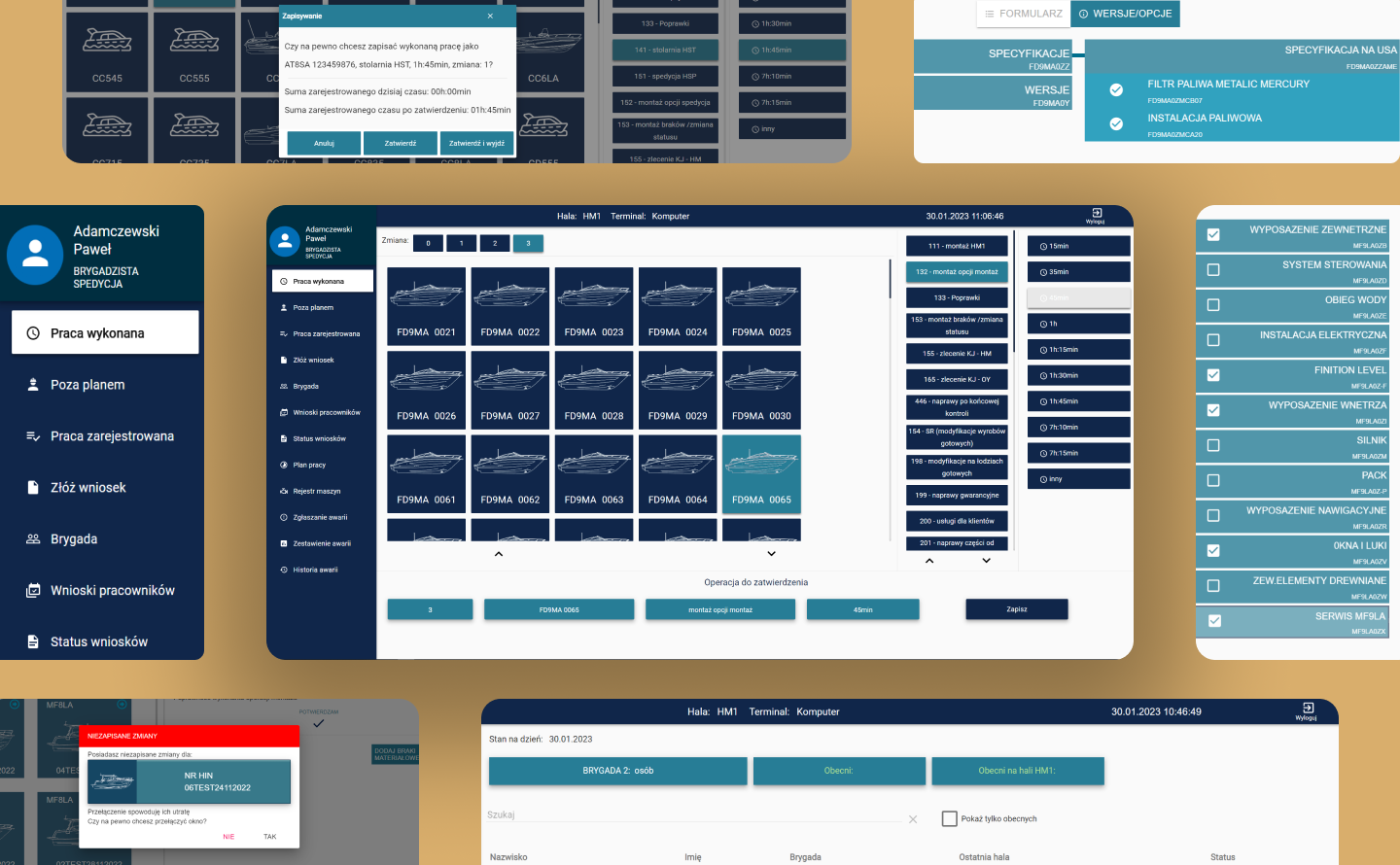Secorun Shop Floor Data Collection is a system registering and monitoring the time spent on various tasks in the company’s production process. It enables effective management of the production process, improves its effectiveness and allows the costs to be reduced. It’s a tool supporting the control process and gives a foundation for calculating the cost of individual production activities. The system allows continuous monitoring of a production team’s work as well as detecting and eliminating downtimes that can generate financial losses for the company. It provides a basis for reliable rewarding of a team and a possibility to choose the leaders.
Secorun Shop Floor Data Collection allows for efficient management of the processing capacities. It is a valuable tool for companies that want to raise the effectiveness of their production processes and gain more control of the production costs. Thanks to the use of touch screens installed next to the workstations it is a very friendly and easy to use tool for the production workers.
“Quick and easy registration of the production tasks – step-by-step, without unnecessary formalities. Constant monitoring of the realized tasks. Quality control of the production adjusted to the company needs.”
Margarita Menjega-Schmidt
UX / UI Designer
Business benefits of the Shop Floor Data Collection
Improving effectiveness and profitability of the company – collecting information about the time worked on a task is helpful when it comes to planning the tasks and making decisions about the resource allocation.
Quick identification of problems and ineffectiveness – the system monitors the production in real time allowing for an on-going ability of correction in case of any irregularities.
Collecting important parameters related to the production process such as the temperature, humidity, identification of the used materials/components (bar codes, QR codes, serial numbers of the materials, such as paints, resins).
The control of the whole production process and its optimization thanks to electronic control documents related to the following production stages. The documents allow for easy access to data and for its analysis.
Short time of the data registration – a software dedicated for touch screens installed next to the workstations and a user-friendly ergonomic UI for the production team.
Quality control – the system shares cross-sectional dashboards presenting quantitative and statistical summary of the quality of the products currently being in the production process. The scope of control includes the technical, functional and aesthetic layer.
USE CASE 1
Zbyszek is a production worker in a company that produces farming machines. According to the needs, he works on various workstations on the production line. After every working day he has to draw up a report of completed tasks – he has to point on which stations he was working, on what machines and how much time it took him to perform every individual activity.
For Zbyszek, after a hard day of work, this duty is time-consuming and really inconvenient.
How could this situation be resolved? Would an implementation of a system that registers all the production activities using touch screens placed by the workstations make performing everyday activities more efficient?
USE CASE 2
Norbert is a production manager in a factory that produces made-to-order exclusive yachts. He noticed that over the last six months, one of the brigades has been having problems with keeping up with the order realization deadlines causing the production costs to increase.
What could help Norbert with continuous control and optimization of the production process? What tool would allow Norbert to identify and solve the problems and to fix all the irregularities immediately?
Is there a system that allows for a continuous watch over the production progress? Is it possible to gather data regarding various significant production parameters such as: time of tasks completion, identification of used materials, outside conditions to analyze the process?
Key functionalities of the Shop Floor Data Collection
Production tasks registration – the worker approaches the touch screen located by their workstation, logs in using a proximity card, chooses a task and the time spent on that task begins to be registered.
Real-time monitoring of the production of the assembled device or a series of devices. A function that can help to plan the tasks and to make decisions regarding the resources allocation.
Tracking the executive standards of realized production activities – the company monitors and checks if the production processes are realized according to certain requirements and standards.
Monitoring of the total time spent on a production task – integration with an ERP system allows monitoring the efficiency of work in terms of time consumption.
Possibility of analyzing any irregularities in the quality control process with the data gathered during the production process(by who, when, in what conditions, using which materials the task was realized).
Intuitive and friendly UI, dedicated for touch screens installed right by the workstations, minimalizing the time of data registration.
Easy log-in based on individual ID cards shared with the Access Control system.
“Shop Floor Data Collection creates a possibility of automatic attribution of work costs of selected people, brigades and departaments depending on their origin divided into groups of realized tasks, resulting in a full picture of the origin of the costs.”
Joanna Kowalska
Sales


Integration with third-party systems
Secorun Shop Floor Data Collection is a platform oriented to integrate with access control systems, time & attendance systems and ERP systems.
Currently, Shop Floor Data Collection is fully integrated with other Secorun package products:


